Oligonol®Study Results
Exercise and Sport
RESEARCHAnti-fatigue and anti-inflammatory effects
Oligonol® alleviated fatigue after exercise.
Japan is an advanced country facing a super-aging society. A healthy life-span that means a
self-supporting life period has attracted attention in recent years. In order to expand a healthy life-span,
moderate exercise habits are crucially important.
The study was carried out to prove attenuating effects of Oligonol® for post-exercise fatigue which prevents
habituation of exercise.
The results demonstrated that intake of Oligonol® during training alleviated a feeling of post-exercise
fatigue in the university long-distance athletes, suggesting that Oligonol® might be useful for daily
sustained exercise.
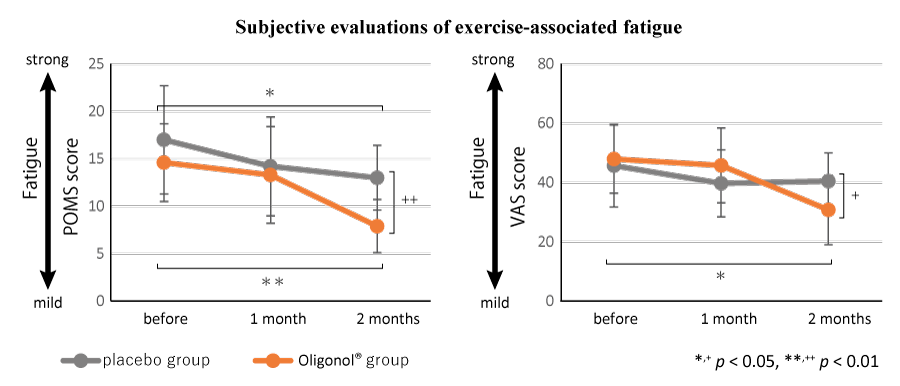
Tetsuya Okumura et al., Japanese pharmacology & therapeutics, 46(8): 1425-1431 (2018)
Clinical study
Design: A randomized, double-blind, placebo-controlled trial
Subject: 20 healthy volunteers (19-22 years old) of male long-distance runners
Groups: Oligonol® (n=10) and placebo (n=10)
Dose and period: 100 mg/day for 2 months during training time
Endpoints: Subjective estimation of mood and a feeling of fatigue using Profile of Mood States (POMS) and
Visual Analog Scale (VAS)
Results
Oligonol® intake significantly ameliorated POMS indices such as “tension and anxiety”, “dysphoria and
despair”, “fatigue”, “disarray”, and “multidiscipline” and improved VAS score including a feeling of
fatigue.
These findings suggested that Oligonol® might recover a feeling of fatigue after training and mood states
responsible for chronic fatigue and dysphoria.
Data are presented as means±standard deviation (SD).
Oligonol® suppressed inflammation after exercise.
Athletes daily go through training to enhance their performance. However, transient inflammation and tissue damage caused by physical overload can induce a strong feeling of fatigue and severe pain, resulting in lowering of exercise performance.
This study investigated whether Oligonol® could relieve inflammation and tissue damage attributable to training.
When the university long-distance athletes took Oligonol® during training, they showed several changes such as reduction of inflammation-related markers and improvement in the parameters associated with repairing destroyed tissues and wounds. Oligonol® might be useful to retain good performance in athletes as well as persons who engage in daily intense training.
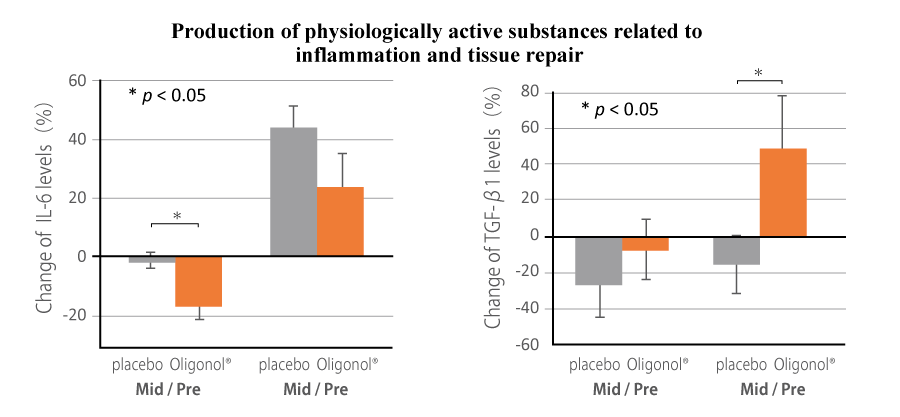
Mikio Nishizawa et al., Phytotherapy Research, 25(10): 1486-1493 (2011)
Clinical study
Design: A randomized, double-blind, placebo-controlled trial
Subject: 20 healthy volunteers (19-22 years old) of male long-distance runners
Groups: Oligonol® (n=10) and placebo (n=10)
Dose and period: 100 mg/day for 2 months during intense training
Endpoint: Blood level of proinflammatory cytokines
Results
Oligonol® significantly decreased IL-6 level and increased TGF-β1 level, suggesting that supplementation
with Oligonol® might improve inflammation or tissue damage caused by extremely intense exercise
training.
Data are expressed as means±standard error of the mean (SEM).
Oligonol® reduced fatigue and pain after exercise, and helped recovery from tiredness.
Moderate exercise habits are beneficial for prevention of lifestyle-related illness and beauty
care.
This study examined if supplementation with Oligonol® attenuates exercise-induced fatigue, which is one of the causes that make it difficult to maintain exercise habits.
In the university athletes, Oligonol® intake during training improved fatigue scores and tended to reduce
muscular/articular pain, lumbago, and menstrual pain. Then, discontinuation of Oligonol® intake showed a
tendency to aggravate these scores.
Therefore, Oligonol® might be effective for maintaining good physical conditions through alleviating a feeling
of physical fatigue and pain caused by exercise.
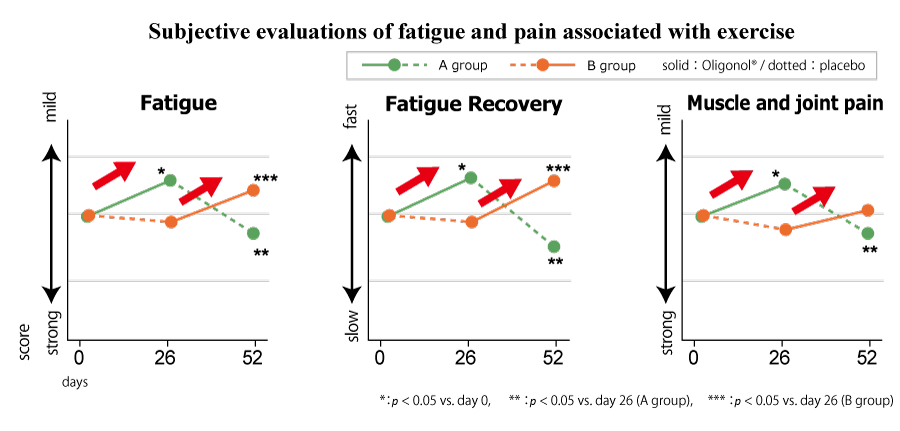
Hideki OHNO et al., Advances in Exercise and Sports Physiology, 13(4): 93-99 (2008)
Clinical study
Design: A prospective single-blind, crossover trial
Subject: 47 healthy volunteers (18-22 years old) of male and female athletes
Groups: Oligonol® and placebo
Dose and period: 200 mg/day for 52 days (26 days x 2) with 9-day washout period
Endpoints: Subjective estimation of fatigue and pain using POMS and Rate of Perceived Exertion (RPE)
Results
Oligonol® supplementation significantly lowered the RPE responses and caused the subjects to feel less fatigued. In addition, Oligonol® significantly improved all the fatigue scores and showed tendency of attenuating muscular/articular pain, lumbago, and menstrual pain.
Oligonol® suppressed physical stress and inflammation during exercise.
Many people may have experience of giving up exercise before making it their daily habit for prevention of lifestyle-related diseases and beauty care. It is mostly because of the stresses they feel during exercise, especially at an early stage of the challenge.
In sedentary persons without daily habit of exercise, it was investigated whether Oligonol® intake during exercise could reduce stress and inflammation induced by exercise.
The results indicated that Oligonol® suppressed the elevation of markers for stress and inflammation.
It is possible that Oligonol® may help you to realize a positive and pleasant life.
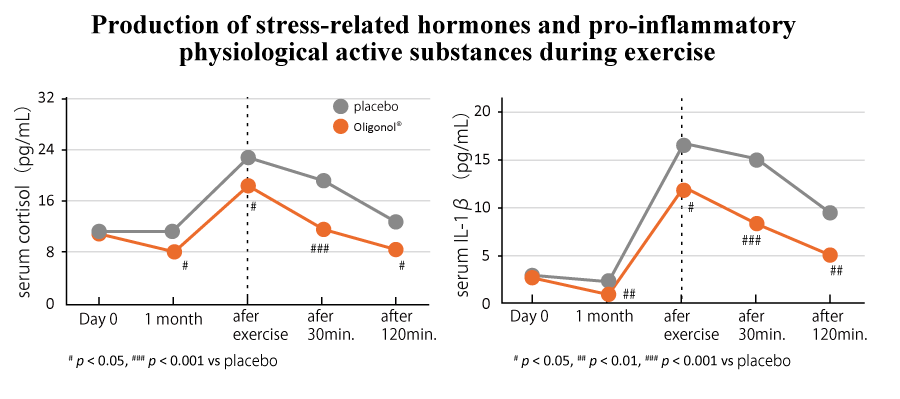
Jeong-Beom Lee et al., Nutrition Research and Practice, 4(3): 203-207 (2010)
Clinical study
Design: A randomized, double-blind, placebo-controlled trial
Subject: 19 healthy sedentary male volunteers
Groups: Oligonol® (n=10) and placebo (n=9)
Dose and period: 100 mg/day for 4 weeks
Endpoints: Serum levels of cortisol*1, IL-1β, and IL-6 *2 before intake and after 120 minutes following
60-minute running
Results
Oligonol® consumption significantly reduced serum cortisol, IL-1β, and IL-6 concentrations elevated by exercise, suggesting that Oligonol® is possible to alleviate physical stress and internal inflammation attributable to exercise.
*1 : Cortisol: so-called the stress hormone of which secretion increases in response to
stress.
*2 : Interleukin (IL): a protein that promotes an inflammatory response in the body (inflamatory
cytokine).
RESEARCHImprovement of stamina
Contributes to exercise performance and suppresses lactic acid accumulation associated with high-intensity exercise
Oligonol® showed significant suppression of the accumulation of blood lactic acid thought to contribute to fatigue and a decrease in power output during exercise. These effects are supposed to be related to the increase in biological antioxidant potential (BAP) and/or the increased efficiency of aerobic energy metabolism by Oligonol® intake.
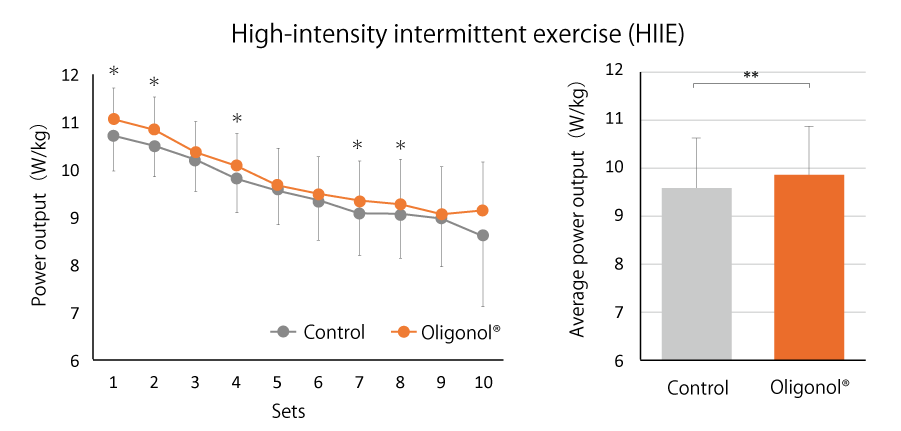
Aki Kawamura et al., Physical Activity and Nutrition. 25(3):8-15 (2021)
Clinical study
Design: Open-labeled trial consisting of non-intervention and intervention manner
Subjects: 10 healthy male athletes (21.5 ± 0.81 years old) belonging to sports teams
Group: Oligonol® and non-intervention periods
Dose and period: Oligonol® 200 mg/day for 7 days after 7 days washout period
Endpoints: Power output, blood lactate levels, levels of reactive oxygen metabolites (diacron-reactive oxygen metabolites [d-ROMs]), BAP, and heart rate
Results
Oligonol® significantly suppressed the decrease in mean power output, increased blood lactic acid levels, and maintained indices related to aerobic energy metabolism during high-intensity intermittent exercise. In addition, BAP also showed a tendency to grow.
Oligonol® enabled to keep running for longer time by suppressing rapid increase of lactic acid.
Enhancement of endurance to maintain exercise performance contributes to keeping up motivation
during exercise and increasing training efficiency.
This study examined if Oligonol® could be effective in improving endurance during exercise.
When healthy and regularly exercising male subjects received Oligonol® during exercise, they could run for a
longer time period and endurance-related parameters were upregulated. Thus, it was demonstrated that Oligonol® might be useful to enhance training efficiency and performance through prolonging exercise performance.
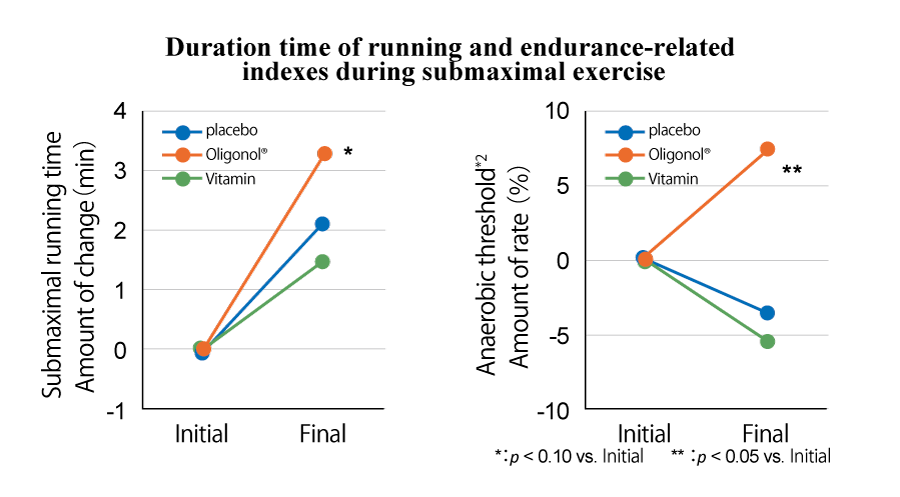
Seung Wan Kang et al., Journal of Clinical Biochemistry and Nutrition, 50(2): 106-113 (2012)
Clinical study
Design: A randomized, double-blind, placebo-controlled trial
Subject: 70 healthy and regularly exercising male volunteers (20-65 years old)
Groups: Oligonol® (n=24), vitamins C and E (n=24), and placebo (n=22)
Doses and period: Oligonol® 200 mg/day, vitamin C 800 mg/day + vitamin E 320 IU/day, or dextrin 200 mg/day
(placebo) for 30 days
Endpoints: Endurance of exercise capacity
Results
Oligonol® significantly elevated the submaximal running time*3 and increased the anaerobic threshold*4. Since the Oligonol® group showed different actions from the vitamins group, the endurance-promoting effect of Oligonol® may not only directly come from the scavenging of free radicals but also may be attributed to other non-antioxidant properties of polyphenols.
*3 : submaximal running time: the duration time of running with keeping the heart rate 80% of the
maximum.
*4 : Anaerobic threshold: the intensity of exercise with which the exercise turns from aerobic to
anaerobic.